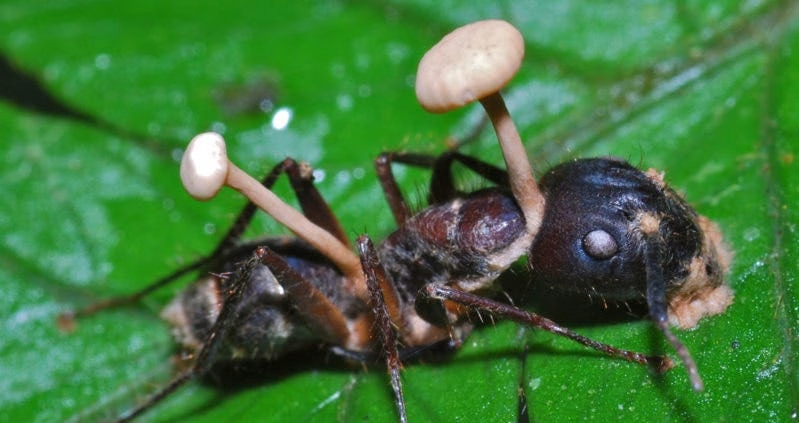Zombie ants aren’t just a horror story. They’re real—and they’re only the beginning.
In one of the most mind-bending discoveries of the decade, scientists have uncovered new strains of a mind-controlling fungus that infects insects, hijacks their nervous systems, and uses them like puppets before killing them in horrifying ways.
And now, evidence suggests this phenomenon is spreading beyond the Amazon—and mutating.
🧠 Meet Ophiocordyceps: Nature’s Mind Hacker
The fungus is called Ophiocordyceps unilateralis, and it targets ants with terrifying precision. Once an ant inhales fungal spores, the parasite begins to grow inside the body—not killing the host, but controlling it.
The fungus rewires the ant’s brain, forcing it to leave its colony, climb to a specific height, bite down on a leaf or tree bark… and die. Then, a long fungal stalk bursts out of the ant’s head, releasing spores to infect the next victim.
It’s a parasite. It’s a puppeteer. It’s a real-life zombie-maker.
🔬 What’s New and Even Creepier?
In 2024, researchers discovered new strains of Ophiocordyceps that are not only evolving but infecting different types of insects, including wasps, beetles, and even some arachnids.
More shockingly:
- The fungus is adapting to warmer climates, making it a potential global threat.
- Some strains show signs of surviving in urban environments, raising questions about its range.
- New variations may extend the host’s life longer—suggesting more advanced neurological control.
One scientist from the University of Copenhagen warned,
“We’re witnessing a parasite that’s learning—fast.”
🌍 Could It Ever Affect Humans?
Right now, there’s no evidence that Ophiocordyceps can infect mammals or humans. Our immune systems and body temperatures are too different from its current insect hosts.
But here’s where it gets eerie.
Fungi like Candida auris and Cryptococcus have already made the leap from harmless to deadly, particularly in immunocompromised people. With rising global temperatures and habitat shifts, some experts fear fungi could evolve faster than we can monitor.
If a brain-controlling fungus were ever to mutate to affect higher animals…
we’d have a real-life “Last of Us” situation on our hands.
🧬 What We’re Learning About Evolution
This fungus doesn’t just kill—it manipulates complex behavior.
That forces scientists to rethink:
- How simple organisms can influence the nervous system
- How behavior might be more chemically driven than we thought
- How parasites play a huge role in ecosystem control
In short, the more we study Ophiocordyceps, the more we realize we don’t know how many other organisms might be pulling strings in the animal kingdom.
🔍 Where It’s Spreading Now
Recent studies have found new fungal outbreaks in:
- Southeast Asia (affecting tropical beetles)
- Southern U.S. (targeting local ant species)
- Parts of Europe (new variants in forest ecosystems)
These findings have launched global surveillance programs to track fungal evolution and monitor ecosystem changes due to these brain-hacking parasites.
🧠 Final Thoughts
It’s easy to dismiss stories of mind-controlling fungi as horror fiction. But this one is backed by peer-reviewed science, satellite tracking, and field research.
A tiny fungus is teaching us big truths—about biology, about behavior, and about how little we understand the world beneath our feet.So next time you see an ant walking alone up a tree, stop and think:
Is it in control of its actions? Or is something else pulling the strings?



